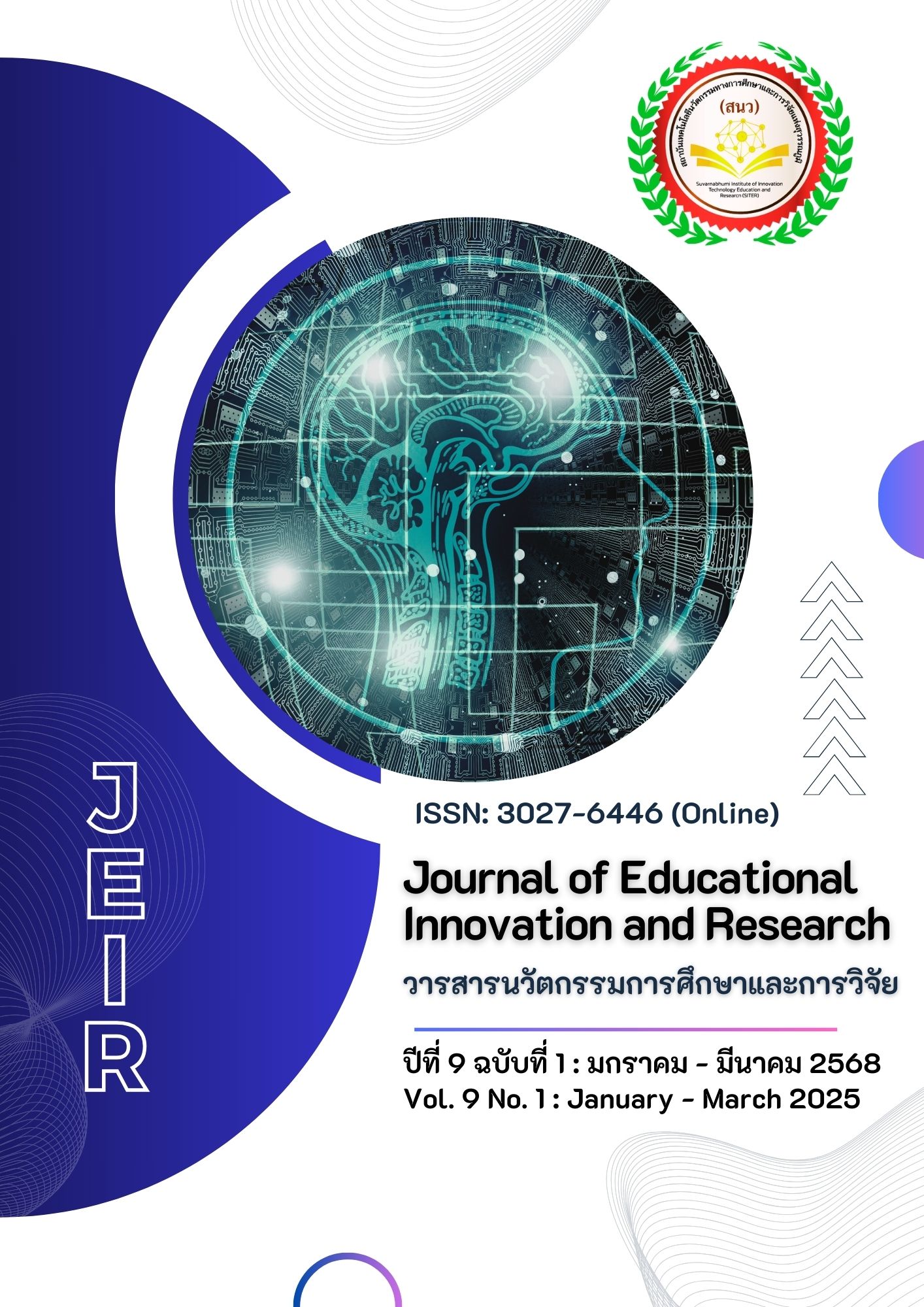การพัฒนารูปแบบการบริหารจัดการแนวใหม่ของคุรุสภาส่วนภูมิภาค
Main Article Content
บทคัดย่อ
กรอบนโยบายการพัฒนาประเทศและสถานการณ์ปัจจุบัน มีความจำเป็นต้องเร่งพัฒนาและปรับตัวเพื่อลดช่องว่างของการปฏิบัติงานให้มีศักยภาพที่เหมาะสม บนหลักการบริหารงานภาครัฐแนวใหม่ เพื่อรับมือกับแนวโน้มการเปลี่ยนแปลงและเสริมสร้างความสามารถของภาครัฐ ให้มีประสิทธิภาพเพื่อรองรับการเปลี่ยนแปลง โดยนำเทคโนโลยีดิจิทัลมาปรับใช้เพื่อการบริหารจัดการเพื่อการพัฒนา และสร้างระบบบริหารจัดการ สร้างระบบที่ส่งเสริมการพัฒนาบุคลากร ให้มีทักษะที่จำเป็นในการให้บริการภาครัฐดิจิทัล รวมทั้งปรับปรุงกฎหมาย ระเบียบ ให้เอื้อต่อการพัฒนา ดังนั้นผู้วิจัยจึงสนใจการศึกษาเกี่ยวกับการพัฒนารูปแบบการบริหารจัดการแนวใหม่ของคุรุสภาส่วนภูมิภาค เพื่อจะนำไปสู่การเป็นรูปแบบการบริหารจัดการแนวใหม่ที่สามารถพัฒนาและนำไปใช้ประโยชน์ทางการด้านบริหารงานในส่วนภูมิภาคขององค์กรวิชาชีพครูและบุคลากรทางการศึกษาต่อไป
การวิจัยนี้มีวัตถุประสงค์เพื่อ 1) ศึกษาสภาพปัจจุบันในการบริหารจัดการคุรุสภาส่วนภูมิภาค 2) ศึกษาวิธีปฏิบัติที่เป็นเลิศในการบริหารจัดการแนวใหม่ของคุรุสภาส่วนภูมิภาค และ 3) ศึกษารูปแบบการบริหารจัดการแนวใหม่ของคุรุสภาส่วนภูมิภาค เป็นการวิจัยแบบผสม ในรูปแบบการวิจัยเชิงปริมาณและการวิจัยเชิงคุณภาพ ดำเนินการวิจัย 3 ขั้นตอน ดังนี้ 1) ศึกษาสภาพปัจจุบันในการบริหารจัดการคุรุสภาส่วนภูมิภาค โดยเก็บข้อมูลจากแบบสำรวจ ผู้บริหารสำนักงานศึกษาธิการจังหวัด พนักงานเจ้าหน้าที่คุรุสภาส่วนภูมิภาค และผู้รับบริการ ขั้นตอนที่ 2) ศึกษาวิธีปฏิบัติที่เป็นเลิศของการบริหารงานคุรุสภาส่วนภูมิภาค จังหวัดต้นแบบ (พหุกรณีศึกษา) โดยการสัมภาษณ์เชิงลึกผู้บริหารสำนักงานเลขาธิการคุรุสภา ศึกษาธิการจังหวัด และพนักงานเจ้าหน้าที่คุรุสภาส่วนภูมิภาค 3) พัฒนารูปแบบการบริหารจัดการแนวใหม่ของคุรุสภาส่วนภูมิภาค จากการวิเคราะห์และสังเคราะห์ข้อมูลจากขั้นตอนที่ 1 และขั้นตอนที่ 2 จากนั้นประเมินความถูกต้องและความเหมาะสมของรูปแบบ โดยผู้ทรงคุณวุฒิ จำนวน 5 ท่าน ผลการวิจัยพบว่า 1. สภาพปัจจุบันในการบริหารจัดการคุรุสภาส่วนภูมิภาค พบว่า 1) ความคิดเห็นของผู้บริหารสำนักงานศึกษาธิการจังหวัด ภาพรวมอยู่ในระดับมากที่สุด ส่วนความคิดเห็นของพนักงานเจ้าหน้าที่คุรุสภาส่วนภูมิภาค ภาพรวมอยู่ในระดับมาก 2) ความคิดเห็นของผู้บริหารสำนักงานศึกษาธิการจังหวัดและพนักงานเจ้าหน้าที่คุรุสภาส่วนภูมิภาค ต่อการบริหารจัดการคุรุสภาส่วนภูมิภาคโดยการนำนโยบายสู่การปฏิบัติ ภาพรวมอยู่ในระดับมาก และ 3) ผู้รับบริการมีความคิดเห็นต่อการให้บริการของคุรุสภาส่วนภูมิภาค ภาพรวมอยู่ในระดับมาก
2. วิธีปฏิบัติที่เป็นเลิศการบริหารงานคุรุสภาส่วนภูมิภาค พบว่า ปัจจัยแห่งความสำเร็จ ได้แก่ 1) บุคลากรศักยภาพสูง 2) การบริหารจัดการเชิงรุก การบริหารจัดการแบบมีส่วนร่วม การบริหารจัดการแบบการบูรณาการความร่วมมือ 3) การพัฒนาระบบเทคโนโลยีสารเทศ และการสร้างทักษะ ความรู้ ความสามารถด้านเทคโนโลยีดิจิทัล 4) การทำงานเป็นทีม 5) การสร้างและพัฒนาเครือข่าย และ 6) ความพร้อมด้านทรัพยากรสนับสนุนการบริหารจัดการ
3. รูปแบบการบริหารจัดการแนวใหม่ของคุรุสภาส่วนภูมิภาค มี 6 องค์ประกอบ ได้แก่ 1) การร่วมมือกันระหว่างองค์กร 2) การทำงานเป็นทีม 3) เทคโนโลยีสารสนเทศ 4) การมุ่งผลสัมฤทธิ์ 5) การสร้างและพัฒนาเครือข่ายในพื้นที่ และ 6) ทักษะความเข้าใจและใช้เทคโนโลยีดิจิทัล
องค์ความรู้งานวิจัยนี้จะสามารถนำไปใช้ประโยชน์ในการพัฒนาโครงสร้าง กำหนดรูปแบบการบริหารจัดการที่เหมาะสม และการขับเคลื่อนนโยบายที่ตอบสนองพันธกิจตามอำนาจหน้าที่ที่กฎหมายกำหนดได้อย่างเต็มศักยภาพ
Article Details

อนุญาตภายใต้เงื่อนไข Creative Commons Attribution-NonCommercial-NoDerivatives 4.0 International License.
เอกสารอ้างอิง
Boonprathuang, A. (2009, December 8). Best Practice?. Oknation. http://oknation.nationtv.tv/blog/ ananbo/2009/12/08/entry-1
Bureekul, T. (2015). Good governance: The important machinery reform for state development. King Prajadhipok's Institute.
Chindanurak, T., Todla, S., Tansawat, A., Wisittapa, W., Chancharoen, T. and Praspan, J. (2017). the Management of Administrative Systems of Teachers Council in the Digital Age. https://elibrary.ksp.or.th/doc_num.php?explnum_id=209
Christensen, T., & Laegreid, P. (2013). New public management: The transformation of ideas and practice. Prentice-Hall.
Drucker, P. (1996). Your Leadership Is Unique. Good News: There Is No One Leadership Personality. Christianity Today International/Leadership Journal, 17, 54-55.
Ferlie, E., Ashburner, L., FitzGerald, L., & Pettigrew, A. (1996). The New Public Management in Action. Oxford University Press.
Hood, C.C. (1991). A PUBLIC MANAGEMENT FOR ALL SEASONS. Public Administration, 69, 3-19.
Hunnak, C. (2017). New Public Management: Changes for Maximizing Productivity. Valaya Alongkorn Review (Humanities and Social Science), 7(3), 125-139.
Jantarasorn, W. (2009). An integrated theory of public policy implementation. Thai University Researchers Association (TURA).
Jiraprayut, P., & Boonyarataphan, T. (2015). The implementation of new public management tools in oil business unit, PTT Public Company Limited. Modern Management Journal, 13(1), 13–34.
Kaewmanee, S. (2013). A study of the conditions and needs of educational professionals regarding the roles and responsibilities of the Teachers Council, Phitsanulok Educational Service Area 3 [Individual Study, Advanced Certificate Course in Public Administration and Law for Executives, King Prajadhipok’s Institute].
Keeves, P. J. (1988). Educational Research, Methodology and Measurement: An International Handbook. Pergamon Press.
Klapajan, P. & Butrsutthivong, P. (2007). Human resource management. K. Pon Printing ltd., part.
Madaus, G.F., Scriven, M.S., & Stufflebeam, D.L. (1983). Evaluation models viewpoints On educational and human services evaluation. (8th edition). Khuwer-Nijhoff Publishing.
Meksawan, D. (2000). Result Based Management. The Reform of The Government System Commission.
Moynihan, P. D. (2005). Why and How Do State Governments Adopt and Implement “Managing for Results” Reforms?. Journal of Public Administration Research and Theory, 15(2), 219–243.
Nathamploy, C. (2020). New Public Sector Management. Journal of Liberal Art of Rajamangala University of Technology Suvarnabhumi, 2(2), 461-470.
National Assembly Library of Thailand. (2010). Efficient and effective meetings. http://www.stabundamrong.go.th/web/book/53/b8_53.pdf
Nimpanich, J. (2004). Policy Analysis: Scope, Concepts, Theories and Examples. Sukhothai Thammathirat Open University Press.
Nowneow, W. (2013). The relationship between the roles and responsibilities of the Teachers' Council of Educational Areas and educational professionals [Individual Study, Advanced Certificate Course in Public Administration and Law for Executives, King Prajadhipok’s Institute].
Office of the Education Council. (2017). The National education plan (2017-2036). Prikwarn graphic.
Office of the National Economic and Social Development Council . (2018). National Strategy (2018-2037). https://www.nesdc.go.th/download/document/SAC/NS_SumPlanOct2018.pdf
Panarach, Y., Chatwirote, B., Chutan, N., Budseeta, P., Kosiyakul, S., Chorphrueksa, T., Srichaimool, U., Witchuworanan, W. (2013). A study on implementation and make a strategic proposal for developing Teachers council of Thailand. https://elibrary.ksp.or.th/index.php?lvl=notice_ display&id=17110
Ratthathammanun Haeng Ratcha anachak Thai (in Thai). [Constitution of the Kingdom of Thailand, 2017]. (2017, April 6). Royal Thai Government Gazette. Vol. 134, Sect 40a. pp. 79-81.
Saleem, F., Naseem, Z., Ibrahim, K., Hussain, A., & Azeem, M. (2012). Determinants of School Effectiveness:A study at Punjab level. International journal of humanities and social science, 2(14), 242-251.
Sareerat, C. (2019). Administration to the excellence of the Primary educational service area offices [Doctoral dissertation, Silpakorn University].
Secretariat Office of the Teachers’ Council of Thailand. (2017, December 15). Karn Damnoen Ngan Tam Parakid Kong Khurusapha suan Phumipak Tam Nayobai Krasuang Suksa Thikarn (in Thai). [The Mission Operations for Provincial the Teachers' Council of Thailand According to Ministry of Education policy].
Serirat, S., Hirankitti, S., Tangsinsapsiri, T. (Eds.). (2007). Management and organizational behavior. (1st Edition). Diamond in Business World.
Sheil, T. (2010). Moving beyond university rankings: developing a world class university system in Australia. The Australian Universities' review, 52, 69-76.
Sirimahasakorn, B. (2010). Knowledge management to excellence organization. Saengdao Publishing.
Sirimeka, T. (2020). The Teachers’ Council of Thailand service records. https://www.ksp.or.th/ksp2018/ 2019/06/6528/
Sirisampan, T. (2012). “Situation trend of public administration” in Concepts Theories and Principles of Public Administration Chapter 15, (8th Edition). Sukhothai Thammathirat Open University.
Srisa-ard, B. (1997). Research in measurement and evaluation. Suriyasarn.
Teachers and Educational Personnel Council Act B.E. 2546. (2003). The Government Gazette. Vol. 120, parts 52a (11 June):1-30.
Trongkamalee, C. (2024). The development of new public management model for provincial the Teachers' council of Thailand [Doctoral dissertation, Silpakorn University].
Van Meter, D. S., & Van Horn, C. E. (1975). The Policy Implementation Process: A Conceptual Framework. Administration & Society, 6, 445-488.
Yarbrough, D. B., Shulha, L. M., Hopson, R. K. & Caruthers, F. A. (2011). The Program Evaluation Standards: A Guide for Evaluators and Evaluation Users, 3rd edn. Sage.


